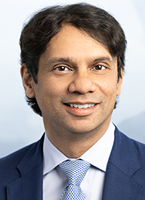Outsourcing From the Empire State Building

By Louis Garguilo, Chief Editor, Outsourced Pharma

“Biotechs must deliver on high expectations with minimal spend. That’s the job description.”
So says Gaurav Shah, M.D., co-founder, Chief Executive Officer, Rocket Pharma, a late-stage gene-therapy company formed in 2015.
Fulfilling that description depends in part on where you choose to operate, and with whom.
Regarding the where, Shah says, “In 2018, we were looking to move from a small office space in New York. While touring a building in midtown, I saw the Empire State Building across the way, and said, ‘Why don't we just go there?’ It turned out to be half price from where we were.”
“And it also looks like a rocket,” he adds with a smile.

That’s the “where,” here’s the “with whom”:
“From our first patient until now, all our manufactured drug product that has treated patients has been produced in partnership with CDMOs who we view as an essential component of how we leverage capabilities, ensure efficiency and overall success in helping patients with devastating rare diseases.”
Like the new location, this component is also changing.
A Second Liftoff
Rocket, taken public in 2018, has a pipeline comprised of first-in-class gene therapies, including adeno-associated viral vector (AAV) and lentiviral vector (LVV) platforms.
Approximately half the newly constructed facility in Cranbury is dedicated to AAV GMP-manufacturing, and includes 20,000 square feet of laboratories for designing, optimizing, and advancing therapeutics to clinical-stage development.
Thus, the all-outsourcing model is about to take an inward turn.
Shah explains in detail: “In the lentiviral space, there are two components – the lentiviral manufacturing, and the cell processing. Both of those components in our three LVV programs are outsourced to CDMOs.”
“In the AAV space, there is one drug product of the viral vector itself. That’s also been outsourced to date for RP-A501, a program for Danon Disease that was recently granted Regenerative Medicine Advanced Therapy (RMA) designation by the FDA, which will provide the benefits of added intensive FDA guidance and expected review through the program's development.
“Our plan for the lenti programs – both for virus and cell processing – will continue to be outsourced even into commercialization.”
But for the AAV component, Rocket is moving in-house (and has built that new facility). That’s where the Rocket pipeline is expanding, and Shah wants more control of “the process, the products, the timelines, as well as the costs.”
Back to the LVV programs, they are already heading towards commercial with first regulatory filings for Leukocyte Adhesion Deficiency (LAD-I) anticipated in the second quarter of 2023 and Fanconi Anemia (FA) in the fourth quarter of 2023.
“I was at Novartis years ago, working on the lentiviral program for KYMRIAH,” he says. “We worked closely with Oxford [Biomedical Research] for the viral vector. Because of folks like Novartis and Oxford, and before that bluebird [bio], GSK and others, our industry has created and been involved in the lenti field for a longer time. It’s a more mature industry.”
As important, historically there's been ample capacity at external providers for these services.
“We chose to synergize with that available capacity and experience, rather than recreating it from scratch. We felt the CDMOs could do a better job, and more quickly than if we tried to build or even acquire.”
Shah, a member himself, says his Board is supportive of the strategy to both outsource and build, the so-called hybrid model.
When I ask him about his investors, he replies they view the new facility as having corporate and commercial value, but also strategic worth.
Some investors prefer one- or two-year timelines toward some sort of profitability. “However,” he explains, “once a company announces there is a facility, it’s then seen as a more integrated, independent organization.”
Today’s savvy investors also recognize that CDMO capacity can be limited, and the cost of goods and services can increase.
“I've had investors come to me and say, ‘We'll help you build an AAV facility, or we'll do a JV [joint venture] with you, although we never went down that route,” Shah adds.
Filters And Focus
Nonetheless, CDMOs remain vital to Rocket. I ask Shah how he selects those partners.
“I’ve had a personal connection with every partner I've ever worked with, employee who's come to Rocket, and board member or investor,” he replies. “We must be able to inspire trust in one another. That's most important.”
As an example, he tells me that while at Novartis, he got to know a service provider called Molmed (now part of AGC Biologics), based in Milan, Italy.
“I knew the folks there very well, although we never quite worked with them at Novartis beyond some small pilot studies,” explains Shah. “But I gained a trust in them through our many conversations.”
“When I started as CEO at Rocket, that was my first call as we explored partners for LVV manufacturing. The relationship has weathered many storms based on that mutual trust and respect. I think that connection is filter number one for selecting a CDMO.”
Filter number two, he says, is experience – a specific type of experience.
“The questions to ask a prospective CDMO are, ‘Have you done this before for other companies that have had success, and ‘What have you learned from the failures you may have experienced?’”
It’s not just about expertise, he says, but the real experiences upon which that expertise is based.
His third filter for selecting a CDMO is cost.
“We're actually willing to go for the Lamborghini of CDMOs, but only if there's a great sense of mutual trust, a large amount of experience, and they're able to deliver on timelines that we set.”
He admits he hasn’t always selected appropriately.
“When you don't apply these three filters [personal connections and trust, expertise and experience, and understanding of costs], it's difficult to be partners with anyone for the long term.”
-----------
Part two with Rocket Pharma’s CEO – a discussion on the “ideal outsourcing relationship” – is next.
